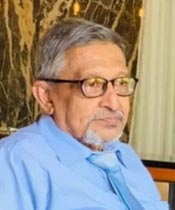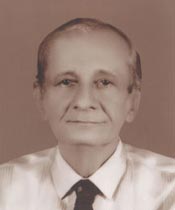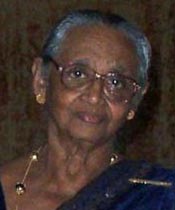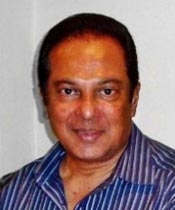Appreciations
View(s): 45
Teacher and educationist who touched our lives
Helakumara Epasinghe
 As Solomon Oritz said; Education is the key to success in life, and teachers make a lasting impact in the lives of their students.”
As Solomon Oritz said; Education is the key to success in life, and teachers make a lasting impact in the lives of their students.”
The name Helakumara Epasinghe remains etched in the memory of most Josephians who had the opportunity of knowing him; as a teacher, friend and guiding light. Affectionately known to generations of Josephians as “Epa”, he was an icon of goodness to all those who were fortunate enough to have stepped into St Joseph’s College, Colombo, an institution which has produced men of erudition who have made and changed the destinies of our motherland.
The great “Guru” of our time passed away on January 5 and his final rites were held on the following day according to his last wishes. He was 84 years old at the time of his departure and to those of us who had the greatest honour and privilege of knowing him or even working together with him during his days at college, he certainly will live on forever in our hearts and minds.
During a career and an inalienable association with St. Joseph’s that spanned well-nigh 34 years, he had been a teacher, sectional head, invaluable friend, advisor, and above all a concerned human being. He joined the Darley Road institution way back in 1968 as a teacher for Physics during the stewardship of that renowned scholar and educationist Rev. Fr. (Dr). Don Peter.
Having completed his preliminary education at Ananda Sastralaya, Kotte, Epa graduated in Physics at Vidyodaya Pirivena (present University of Sri Jayewardenepura). He had honed his skills at Henegama Central College before joining St Joseph’s in 1968 and continued a journey of success until his retirement in 2002.
We were extremely fortunate to have come under the tutelage of such teachers who imparted knowledge and virtue as they treated teaching as a service-oriented profession. We remember such men of sterling character with reverence, respect and gratitude. Besides Epasinghe, there were teachers of the calibre of Joe Perera, Gamini Samarasinghe and M.G.I Ferdinands to name a few.
Epasinghe had the remarkable ability to bring a certain infectious vivacity to the subject of Physics which he taught and demonstrated with great enthusiasm and interest. We eagerly awaited his lessons invariably interspersed with exciting anecdotes that facilitated the ready assimilation of what he taught. He laid a solid foundation for all of us not only on an academic level but on how to use simple common sense in life.
In his whole career as a teacher and an educationist par excellence, Epa was able to manage the roles of sectional head and then senior advisor/consultant with ease and acceptance.
He was a man of great humour who could diffuse a situation with a pithy remark or a humorous turn of phrase. He preferred to use these as an instrument of discipline rather than resort to corporal chastisement. Yours truly once hastily returned to the classroom by whistling just after playing an “interval” cricket match at the so called Beira ground. His humorous remark “This is not the pigeon catching time” is fresh in my memory even after three decades and was far more effective than discharging the best from the cane.
A man of great principles and policies he could have easily bartered his experience and qualification to any lucrative profession. He could have easily emulated his elder sibling Prof. P.W. Epasinghe, a Mathematics wiz but he preferred teaching.
Epa had a great memory. When a contemporary of ours who is a professor in Ireland met him in a suburban town in Colombo nearly 20 years after leaving school, to the amazement of the student he recalled his full name and the year that he had left school!
We share our grief with his offspring Duminda, Parinda (my contemporary), daughters Dimuthu and Diana. His wife Pearl, a school principal predeceased him some years back.
I am reminded of famous words of the Iranian poet Omar Khayyam: “The moving finger writes, and having written moves on. Nor all thy piety nor all thy wit, can cancel half a line of it.”
May he attain supreme bliss of Nirvana!
Supun Perera
The legacy of this erudite Buddhist scholar will remain for a long time to come
Alec Robertson
 The 21st death anniversary of Deshabandu Alec Robertson fell on December 31, 2023.
The 21st death anniversary of Deshabandu Alec Robertson fell on December 31, 2023.
Alec Robertson was a high calibre Buddhist scholar whose demise has left a void in our society which is still palpable despite the passage of over two decades since his passing away in 2002 at the age of 74 years. This loss is felt alike among ordinary folk as well as Buddhist scholars amidst whom he shone like a beacon given his intellect and profound knowledge of the Buddha dharma.
It is interesting to note that he was born to a Catholic Burgher family. His father was residing in Dodanduwa and he usually accompanied him whenever he made an occasional visit to the famous Dodanduwa island hermitage which was in close proximity to his father’s place of work. This was the abode of two scholarly reclusive German monks Gnanathiloka and Gnanaponika Maha Theras. Such encounters though rare, seem to have made an impact on the mind of young Alec. His thirst for the Dhamma was thus awakened.
His father was a free thinker and had an interest in comparative religion. He had many books at home including books on Buddhism which young Alec read avidly. He embraced Buddhism while still in his teens, through conviction grounded on a sharp intellect.
His quest to learn the Buddha dhamma opened very vividly in front of him with his association with scholarly erudite monks of yore like Venerable Palane Vajiragnana, Narada, Piyadassi, Kassapa and Soma theras, all of whom were incumbent monks of the Vajirarama temple.
It is around this period that Alec Robertson met Prof. Gunapala Malalasekera who was a scholar of Pali. Mastering the Pali language, he relentlessly went on to master the Buddha Dhamma and acquire a deep understanding of all the three pitakas in its pristine purity.
He did not have degrees in Buddhism nor did he follow any post graduate courses in Buddhist universities. He resorted to study the Suttas in depth, and was, essentially a self-made Buddhist scholar par excellence.
Alec Robertson was also endowed with a very good memory and a knack of clear presentation. These rare attributes, complemented with a profound knowledge of the Dhamma which he practised and experienced made him a highly sought after speaker in a wide array of Buddhist fora. He had that charisma and personality that drew crowds. With his mastery of both the Sinhala and English languages as well, he often used public transport in his young days to reach distant venues in the outstations. Such was his deep commitment to propagate the Dhamma.
Those who were privileged to listen to his talks still remember him for the eloquence and clarity of presentation, and not merely the depth of knowledge. How he answered any question that was raised was a sheer delight to watch, as the answers were prompt, precise, simple and relevant. The discussions usually followed a talk delivered by him. He encouraged questions and discussions.
On a personal note, I remember how initially as a school boy and subsequently as a medical student I listened to his talks at Maitriya Hall on Saturdays conducted under the auspice of the Servants of the Buddha. He commenced participating in these meetings of the Servants of the Buddha while attending school and became its assistant secretory at the tender age of 21 years. He was then its secretary, and eventually took this society to lofty heights by being its president for 30 consecutive years. The Society itself has been in existence for 102 years.
My father was very impressed with Alec Robertson and made it a point to come to Maitriya Hall when he was the speaker.
I too along with my siblings had to accompany our parents but once Alec Robertson started his talks I was virtually riveted to my seat.
Many years later, now as a doctor I followed my father’s footsteps and made it a point to follow these talks at Maitriya Hall whenever time permitted.
Alec Robertson’s commitment to disseminate his knowledge and experience of the Dhamma was not confined to his talks. He published extensively. Very useful articles were written in Buddhist journals both locally and internationally and to newspapers. One such feat was to contribute an article in English to the Annual Buddhist Journal “Vesak Sirisara” every year over two decades without any interruption.
Let me now quote a few excerpts from one of his publications:
“In the days long past when we moved leisurely and at an even tenor and pace the corrupting and corroding influence of technology and materialism, had not spread their tentacles. It was comparatively easier for man to lead balanced, contented and happier lives. Thus, if we are to meet the various problems and challenges in the modern age with confidence and courage, we have to build up our moral and spiritual resources and also draw from our inner reserves of strength of character and stamina.
The compassionate Buddha has shown us the way to the achievement of such an objective. It is the simple basic requirement of the observance and the practice of the five precepts which will inevitably bring harmony, peace and happiness to our confused and disordered lives, and also usher in a stable, peaceful and harmonious society.
By the observance and practice of the five precepts one will not, in any way, cause harm to oneself and to the society at large. As a consequence peace, concord and harmony will reign in the hearts and minds of the individual and the various racial and religious groups that exist in society. This earth of ours would be transformed into a veritable heaven.”
He wrote this article several decades ago in the last century, but when we look around society, with rampant corruption, deceit, wars, and massacres of the innocent we realize how true his assessment and predictions were, and how relevant all that is to the world today overwhelmed with so much turbulence and violence.
So let us remember this great son of Sri Lanka as a scholar of Buddhism and an eloquent, erudite presenter who had so much of wisdom and foresight with a deep commitment to alleviate the suffering of mankind by propagating the teachings of the Buddha in a simple and practical way aligned to the simple contented life style he led himself.
He is no longer with us but the legacy he has left will remain for a very long time to come.
And I believe that the greatest tribute we could do is to make every effort to transform this unstable society the world over to a stable peaceful society by using the simple modalities of Non-Violence and Truth which are achievable by adhering to the “pancha sila” which is the very quintessence of the solution Alec Robertson detailed so eloquently.
May he realize the supreme bliss of nibbana with the least delay.
“Sabbe saththa bawanthu sukithatha.”
Prof. Kolitha H. Sellahewa
My unforgettable grandmother, there’s so much to write about
Hemakanthi Wijekoon
 When my mother remarked this morning that I had not written anything to the newspapers in memory of my grandmother who passed away last year, I felt miffed. I considered it to be insensitive to limit all the wonderful moments I spent with her to a few words. Then again, here I am, putting down my thoughts on a computer keyboard, getting distraught over having to revisit the past.
When my mother remarked this morning that I had not written anything to the newspapers in memory of my grandmother who passed away last year, I felt miffed. I considered it to be insensitive to limit all the wonderful moments I spent with her to a few words. Then again, here I am, putting down my thoughts on a computer keyboard, getting distraught over having to revisit the past.
My grandfather was born on January 10, 1924. It was quite a coincidence that my grandmother’s demise happened on January 10 of 2023 – what would have been her husband’s 99th birthday, had he been alive. She outlived her husband by 17 years. Of the two of my grandparents, it was my grandfather who wished to live long to see his grandchildren get married and have kids. However, it was my grandmother who was able to relish all these milestones – she was present for both her grandchildren’s weddings and was able to enjoy being promoted to the status of a great-grandmother with the birth of my son. By her demise at 96 years of age, she had witnessed and experienced much more than any of us could ever have in all our lifetimes put together.
My grandmother suffered from osteoarthritis in her legs, for as long as I can remember. She had trouble climbing stairs, standing for a long time and sometimes even sitting down. However, her ailments, aches and pains never stopped her from baking the most delicious of cakes, cooking the creamiest of coconut milk curries (‘kiri hodi’) and formulating the crispiest of fried sprats and dried fish. I still remember the taste of her ‘handi kavum’ (oil cakes with a scalloped ridge) and ‘unduwel’, which were prepared with much pleasure when my cousin and I passed important exams such as O/Ls and A/Ls. These sweets garnished the new year table every April as well.
There was a time that my grandparents lived close to the Kandy Hospital. My mother and two uncles were still kids then. Due to the proximity to the hospital, there were regular visitors and patients from the respective villages of my grandparents, who were provided with food and accommodation in their house. Although life was tough, my grandmother wholeheartedly catered to the needs of all these visitors and patients. One could easily see that it is this good karma which enabled her to receive continued support and care during the last three years of her life, when old age had taken its toll and she had to be confined to a wheelchair most of the time.
There is a lot I could write about my grandmother, hence, the pressure of trying to squeeze everything into a concise write-up. She practically brought me up, basically went into an early retirement just to take care of me as a child. Being an English teacher, she was the one who nurtured my language skills, my aptitude to communicate without fear and to go forth and conquer my dreams. She is always with me, every time I write or type a word, because she laid the basics and foundation in lining up my thoughts in a meaningful manner.
Missing you is inevitable, but given the wholesome life that you led, we know you are in a good place. May your journey in samsara be a short one.
Dr. Viduranga Waisundara
I miss your laugh, your lame jokes
KENNETH PERERA
 January 4 would have been your 76th birthday. I pray to God to keep you safe in heaven and let you rest in his loving arms. You left a legacy and lots of memories for us. Every day I am thankful to God for your love and friendship.
January 4 would have been your 76th birthday. I pray to God to keep you safe in heaven and let you rest in his loving arms. You left a legacy and lots of memories for us. Every day I am thankful to God for your love and friendship.
I miss your laugh, your lame jokes. Each sunset reminds me of your smile, the way you’d brighten every moment. I still remember all the times you and I had together from home to school and tuition class.
It is hard to believe that it is been five years. Priyani, I know this is a loss that hits you and Milinda so deeply. Kenneth was blessed with a wonderful wife and son. I know Kenneth’s birthday is very difficult for you both and I wanted you to know that I am remembering Kenneth. I want to share with both of you a comforting prayer;
Dear God, on this day the 76th Birthday of my dear friend, I pray for his peace and happiness in your divine presence. May his soul find everlasting joy. Rest in Peace.
Your everloving friend Lalin De Silva
A pragmatic positive personality
Pushpadevi Sanmugaratnam
In a world where authenticity is rare, she remained an original!
An embodiment of unconditional love with her trademark effervescent smile, Pushpam (as she was fondly addressed) illuminated not just the room she walked into but also the lives of all those that she took under her matriarchal wing.
She was my 87-year-old mother’s best friend! She was also my seven-year-old niece’s best friend. It goes without saying that she was my best friend too! Such was her alluring charismatic personality that led to her forming strong bonds irrespective of age.
An exemplary student of Ladies’ College, despite having navigated through a multitude of health challenges at a young age, she emerged into adulthood an extremely positive, sanguine soul never perturbed by anything or anyone.
For Pushpam nothing was ever impossible. She would move mighty mountains for her kith and kin with her unwavering, deep rooted faith that strengthened her fortitude.
She was a pragmatic lady who exuded optimism with her authoritative efficiency that was almost infectious; hence remaining an enigma for many.
On December 3, 2023, we bid farewell to this phenomenal soul in the most ceremonious, distinguished manner. The colossal bouquets and wreaths that completely filled the room were added testimony to the lives she had touched.
Pushpam lived a truly magnanimous altruistic life and enriched the lives of many.
Though she will be sorely missed, her life will certainly be celebrated for generations to come.
Dr. (Mrs) Dammika Sainath
